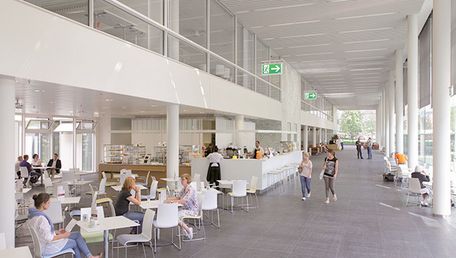Areas
Key treatment areas
- Planning and provision of dentures taking into particular consideration the double crown system as denture anchors
- Treatment of pain and dysfunctions in the stomatognathic system (masticatory system)
- Treatment of defects and malformations in the maxillofacial region
- Implant prosthetics
Key research areas
- Double crown system as a prosthetic-restorative treatment concept
- Function-oriented occlusion forming and masticatory function analysis
- Functional diagnostics and functional therapy for myoarthropathy / craniomandibular dysfunctions (CMD)
- Galvano-forming
Within the field of dental medicine, considerable significance is attached to dental prosthetics. The Polyclinic for Dental Prosthetics provides not only treatment for patients but is involved in consultation and planning to a considerable extent. It serves as a point of contact for any queries related to the subject of dentures, regardless of whether crowns, bridges, plates, etc. are involved. Here, the Polyclinic closely cooperates with other dental and medical disciplines within the University Hospital.
The Clinic pays particular attention to the diagnostics and therapy of pain and discomfort and the associated problems in the field of tempero-mandibular joints and mandibular muscles (“myoarthropathy”). The Polyclinic has special outpatient departments for these sectors. These outpatient departments also treat the, in some cases, considerable defects and malformations in the maxillary and facial region (“maxillofacial prosthetics”).
The Polyclinic’s field of activities is supplemented by the provision of dentures following the surgical implantation of artificial dental roots, so-called implants (“implant prosthetics”).
The Polyclinic for Dental Prosthetics is a major component of the West German Clinic for Maxillofacial Medicine which, evolving in 1917 from a citizens initiative, was established in inner-city Düsseldorf and then housed in Himmelgeist House following the Second World War. Right from the very beginning, the Polyclinic for Dental Prosthetics endeavoured to maintain close contact between patient care, teaching and research. This decades-long tradition is to be continued in future too. Special mention should be made of the Polyclinic’s involvement in the development and application-oriented optimisation of the so-called telescope system to which the Clinic has made a major contribution. The telescope system is a universally applicable method for anchoring dentures.
Patient care
In general, in the outpatient and special outpatient departments of the Polyclinic for Dental Prosthetics, patients are examined and treated directly by academic assistants. Furthermore, within the student training courses in the subject of dentures medicine, different treatment procedures for dentures are discussed and applied in practice. In specific terms, this means that advanced students treat and look after patients as part of their courses. Of course, this takes place under continuous professional supervision.
The Polyclinic’s academic assistants continuously check and review the performance of the different treatment procedures. This permanent quality control ensures adherence to high treatment standards. Extensive prosthetic-restorative treatment procedures are commenced in students’ training courses, as a rule at the beginning of the respective academic term. Nevertheless, the Polyclinic tries, as far as possible, to take into consideration patients’ wishes with regard to treatment dates.
The duration of treatment is governed by the scope and degree of difficulty of the prosthetic-restorative work involved and by the necessary pre-treatment. Since the majority of patients has to undergo extensive treatment, a certain period of time is entailed in treatment which frequently cannot be completed within a few days. Cost reductions are granted for dental treatment covered by contracts with health insurance companies and for certain prosthodontic work. Each completed treatment is followed by a thorough dental and prosthodontic post-examination in order to check for adherence to the high quality standards.
Research and teaching
The Düsseldorf Polytechnic for Dental Prosthetics examines and treats various key areas. The analysis of double crown systems in the form of telescopic anchorage is of central significance. The relevant investigations focus on both the material itself and the long-term probation of this method. The double crown system is presented and intensively practised during teaching.
Another key research area at the Polytechnic for Dental Prosthetics involves the function-oriented handling of restoration work, functional diagnostics of the masticatory system and functional therapy for craniomandibular dysfunctions and orofacial pain. Here, analyses are performed by means of electronic computer-aided measurement systems and imaging processes. Furthermore, the following sectors are academically covered: Forensic dental science, galvano-forming of dental restoration work, evidence-based analysis of prosthetic-restorative measures taking into consideration functional aspects, maxillofacial prosthetics, dental medicine for elderly patients (gerontoprosthetics) and the application of multimedia elements in preclinical and clinical dental teaching.
More Information
Direct link to us: Poliklinik für Zahnärztliche Prothetik




